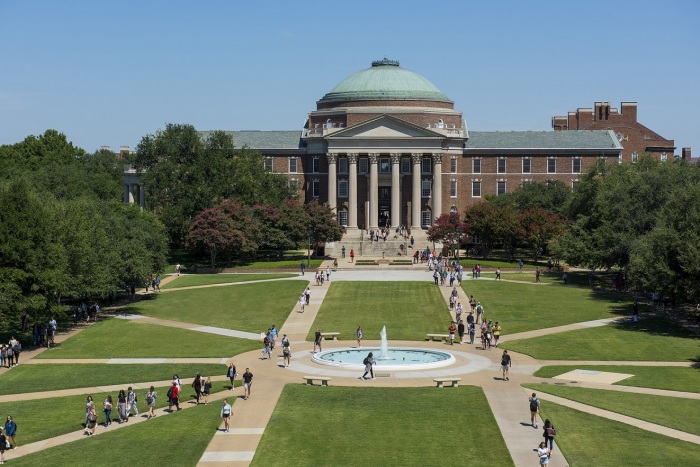
The Texas Supreme Court has ruled that a regional body of The United Methodist Church can sue Southern Methodist University over its effort to disaffiliate from the denomination.
Founded by the UMC’s predecessor denomination in 1911, SMU is home to the Perkins School of Theology, which is one of 13 UMC seminaries that receive aid from the denomination’s Ministerial Education Fund.
According to its own figures, as of last year, SMU has an endowment of $2.12 billion, more than 1,700 staff and administrators, and approximately 12,000 students. The university is also home to the President George W. Bush Library and Museum. The former president and his wife, former first lady Laura Bush, are also members of Highland Park United Methodist Church, which is adjacent to the SMU campus.
The state’s highest court released a decision last Friday in the case of Southern Methodist University and Paul J. Ward v. South Central Jurisdictional Conference of the United Methodist Church and Bishop Scott Jones.
Texas Supreme Court Justice Debra Lehrmann authored the majority opinion, concluding that the UMC South Central Jurisdictional Conference “has statutory authority to sue SMU to enforce its rights under the articles and the Texas Business Organizations Code and that the Conference may pursue, at least at this stage, its breach-of-contract claim as a third-party beneficiary of SMU’s articles of incorporation.”
“SMU is not required to act for the Conference’s benefit in the way that corporations must act for the benefit of their shareholders or members,” wrote Lehrmann. “However, as with for-profit corporations, a nonprofit corporation’s articles do constitute a contract between SMU and the State of Texas.”
“The Conference alternatively alleges in its petition that it is a third-party beneficiary of that contract and may pursue its breach-of-contract claim in that capacity. We agree.”
However, Lehrmann also wrote that the university was “entitled to summary judgment on the false-filing claim,” rejecting the UMC’s claim that SMU knowingly filed false paperwork when the university changed its governing documents.
Texas Supreme Court Justice Jane Bland authored an opinion that partially dissented, believing that the high court took “a step too far” as it was “permitting private contract causes of action akin to derivative actions.”
“None of the statutes governing nonprofits suggest private contract rights are a follow-on benefit to nonprofit charter provisions. Instead, the parties must mutually confer contract rights through a separate agreement—not through the State’s enforcement power,” wrote Bland.
“We should hold that a nonprofit’s charter does not confer third-party beneficiary status via the State. By recognizing such a claim—one not even the Conference advances—the Court breaks new ground on its own.”
In response to the ruling, SMU said in a statement to The Texas Tribune that it was pleased with the decision to drop the false-filing claim and that it was ready to defend its decision to leave.
“SMU remains proud of its Methodist heritage as we move forward with advancing SMU’s mission and providing enriching education for all students,” stated Megan Jacob, SMU’s director of media and community relations, as quoted by the Tribune.
For its part, the conference issued a statement saying that the “favorable opinion from the Court supports our original position that SMU must seek the approval of the SCJ when making changes to its amendments.”
“Our desire is to see this matter brought to a peaceful resolution so that our historic connection to the university can be fruitfully maintained for future generations,” stated the regional body.
For decades, the UMC debated whether to change its Book of Discipline to allow for the blessing of same-sex unions and the ordination of people in same-sex relationships.
In February 2019, at a special session of the General Conference, delegates passed “The Traditional Plan,” a measure that reaffirmed the rules on ordination and marriage.
Later that year, in response to the divisive debate, the SMU Board of Trustees voted to affirm that they, rather than the conference, were “the ultimate authority for the university.”
In December 2019, SCJC filed a lawsuit accusing SMU of “unauthorized acts” and stating that the regional body was supposed to be the “electing, controlling, and parental body of SMU.”
Although a Texas district judge issued a ruling in favor of SMU in 2021, a three-judge panel of Texas’ Fifth Court of Appeals reversed the lower court ruling in July 2023, noting that the UMC has a detailed history with the university.
“In this case of first impression, we must determine whether a nonprofit corporation like SMU, whose governing documents provide that it is to be ‘forever owned, maintained and controlled’ by the conference and that no amendments to said articles ‘shall ever be made’ without the conference’s prior approval, can unilaterally amend the articles to remove these provisions and all other references to the conference,” the opinion stated.
While the panel rejected the district court’s dismissal of the conference’s breach-of-contract claim, they upheld the dismissal of the claim that SMU breached its fiduciary duty when it moved to separate from the church.
“We have already determined […] that the conference has no legal or equitable title to the SMU campus under its claim of fiduciary duty and therefore affirm summary judgment on that theory of recovery,” stated the panel opinion.
Last October, the Texas Supreme Court agreed to hear the appeal.
The UMC General Conference voted in 2024 to strike down the rules on marriage and ordination after thousands of mostly conservative congregations had left the denomination.




